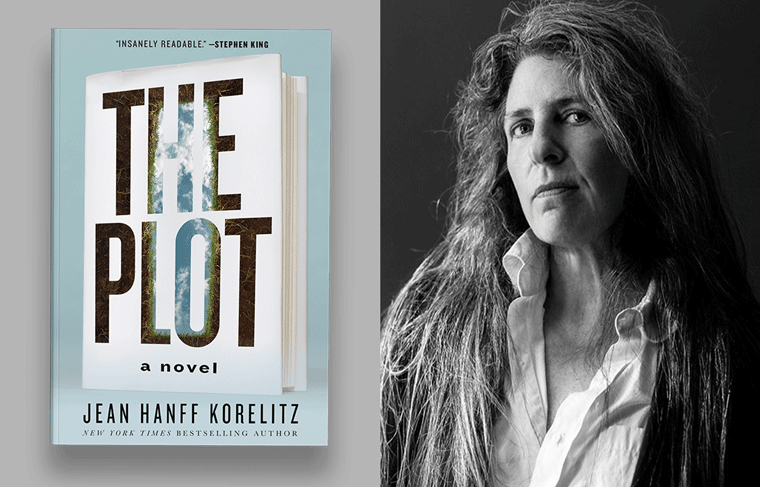In Jean Hanff Korelitz’s new page-turner The Plot, a failing author steals an unused idea for a bestselling book with deadly results. Celadon talked with Korelitz about how she came up with the idea for The Plot and the role of artistic appropriation in creating new stories.
By Jennifer Jackson
At the risk of sounding too meta, how did you come up with the plot of The Plot?
Some of my novels have arisen from (literally) decades of asking myself a “What if?” question. What if that insane Irish infanticide case (the “Kerry Babies” affair of 1984) was set in America and combined with The Scarlet Letter? (That was The Sabbathday River, 1998.) Or, What if Richard Strauss’ Der Rosenkavalier took place in New York City in the 1990s, and everyone in it was Jewish? (That would be The White Rose, 2004). Others have come out of the blue, almost fully formed, which was the case with You Should Have Known (2014) and with The Plot. This is not to say that I haven’t long obsessed over the issues at the heart of The Plot. Like most writers I’m fascinated by plagiarism and the murkiness around creative appropriation: chefs stealing recipes from other chefs, comedians helping themselves to other comedians’ jokes, academic theft, and above all creative writers appropriating work by others. I’m hardly the first novelist to write about this — there’s an entire sub-genre of Stephen King work on this theme — and it’s not the first time I’ve touched on it in my own work (both Admission and The Devil and Webster feature plagiarism and plagiarists) but it’s the first time I’ve placed it front and center in a book. I think it makes sense to write about the things that fascinate us. I love campus novels, and I wrote one (The Devil and Webster, 2017). I love novels about writers, and now I’ve written one.
While writing this book, you must have put yourself in the shoes of your main character. Do you think you’d ever steal a genius idea for a book if you knew it would never be used?
I wouldn’t, but only because I’m squeamish by nature and I’d be terrified about that degree of exposure and disapproval. But, like most artists, I also understand that stories run underneath the ground of our collective experience, and we all dip into them, whether we’re aware of it or not. The real question is: At what point does a collective story become the individual property of a person or an artist? Who’s going to seriously accuse Jane Smiley of “appropriating” Shakespeare when she wrote A Thousand Acres, or Charles Frazier of stealing from Homer when he wrote Cold Mountain? A contender for the 2020 Pulitzer Prize for Drama was The Inheritance by Matthew Lopez, which openly adapts Forster’s Howards End to contemporary New York City. This is a normal, even laudatory practice, which artists fully understand. But to help yourself to the specific plot of a recently deceased author who never completed his book? I don’t know where the line is, exactly, but I’m pretty sure that’s over it.
Throughout The Plot, several characters posit that writing can’t be taught. As a writer, do you agree or disagree?
Let’s just say that I’ve long felt there’s a limit to what can be taught. On the other hand, I have many friends who have benefitted from time in MFA programs and writing seminars, and my husband teaches poetry writing at the college level, I think rather effectively. I didn’t go the MFA route, myself, but I did take a creative writing class in college and I learned something very important in that classroom, which was that I was allowed to make things up. It seems so obvious, but in my own case, I required someone to explain that to me, and I’m grateful to this day that my teacher did.
You’ve already published six novels, including You Should Have Known, which is being adapted into the HBO series The Undoing, starring Nicole Kidman. What has been the most exciting part of seeing your novels adapted for the screen?
In both cases, the most exciting thing was stepping onto the set and seeing hundreds of people running around and doing their jobs — whether that was acting, doing makeup, directing, cooking lunch, directing traffic, or any of the other countless things that get done around filming — and realizing that none of them would be there if not for something I’d made up in my pajamas. Tina Fey (who starred in Admission) once said that her proudest accomplishment was giving employment to so many people, and I’ve certainly had moments of that, but it’s also worth noting that the author of the adapted work is probably the least valuable person on a film shoot. On both sets I was introduced to people who clearly had no idea there even was a novel the project had been adapted from. “Oh. There’s a book? Cool.”
What are you working on next?
I’ll be returning to a novel I set aside in order to write The Plot. It’s called The Latecomer, and it’s about a family with triplets and a fourth child, born many years later from a leftover embryo. It’s a big, sprawling book about siblings who wander very far from one another, but who ultimately come back — as Evelyn Waugh once wrote — with a twitch upon the thread. Or perhaps, in this case, a yank.

